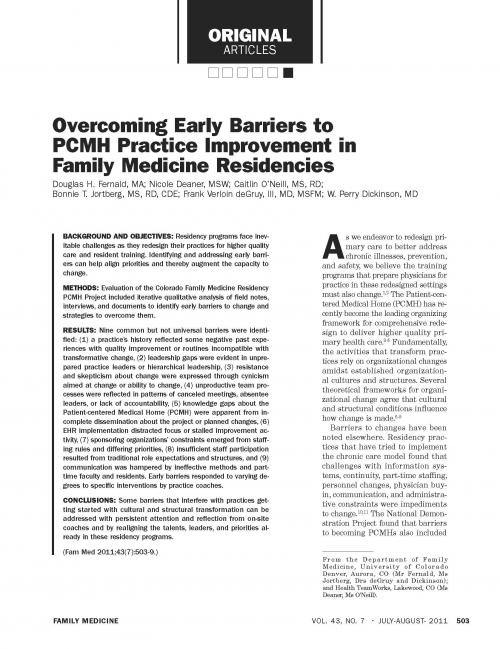
Douglas H. Fernald; Nicole Deaner; Caitlin O'Neill; Bonnie T. Jortberg; Frank Verloin deGruy III; W. Perry Dickinson
Background and objectives: Residency programs face inevitable challenges as they redesign their practices for higher quality care and resident training. Identifying and addressing early barriers can help align priorities and thereby augment the capacity to change.
METHODS: Evaluation of the Colorado Family Medicine Residency PCMH Project included iterative qualitative analysis of field notes, interviews, and documents to identify early barriers to change and strategies to overcome them.
RESULTS: Nine common but not universal barriers were identified: (1) a practice's history reflected some negative past experiences with quality improvement or routines incompatible with transformative change, (2) leadership gaps were evident in unprepared practice leaders or hierarchical leadership, (3) resistance and skepticism about change were expressed through cynicism aimed at change or ability to change, (4) unproductive team processes were reflected in patterns of canceled meetings, absentee leaders, or lack of accountability, (5) knowledge gaps about the Patient-centered Medical Home (PCMH) were apparent from incomplete dissemination about the project or planned changes, (6) EHR implementation distracted focus or stalled improvement activity, (7) sponsoring organizations' constraints emerged from staffing rules and differing priorities, (8) insufficient staff participation resulted from traditional role expectations and structures, and (9) communication was hampered by ineffective methods and part-time faculty and residents. Early barriers responded to varying degrees to specific interventions by practice coaches.
CONCLUSIONS: Some barriers that interfere with practices getting started with cultural and structural transformation can be addressed with persistent attention and reflection from on-site coaches and by realigning the talents, leaders, and priorities already in these residency programs.
